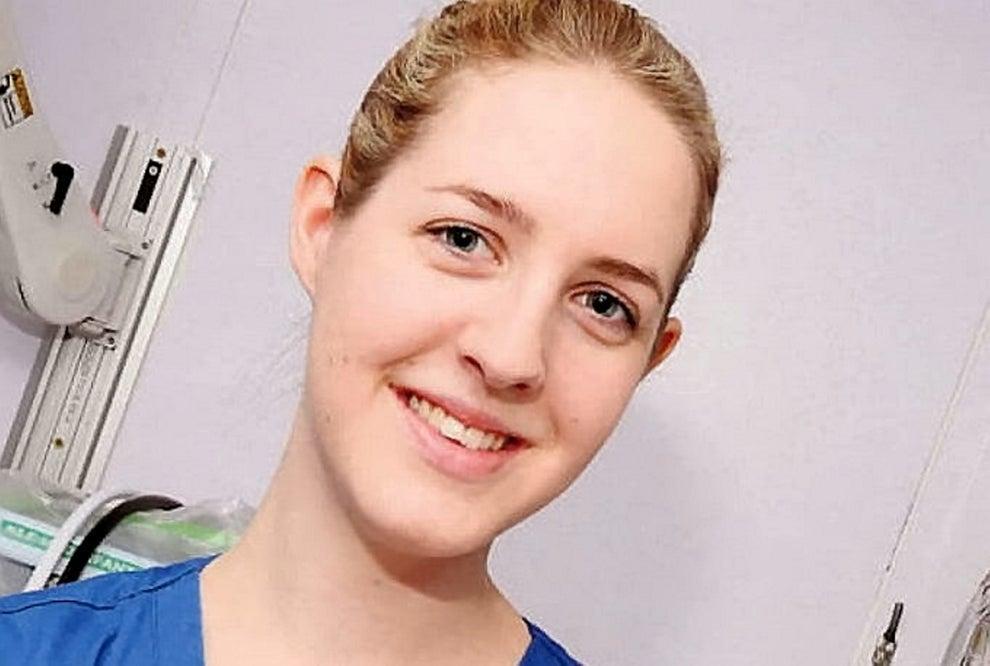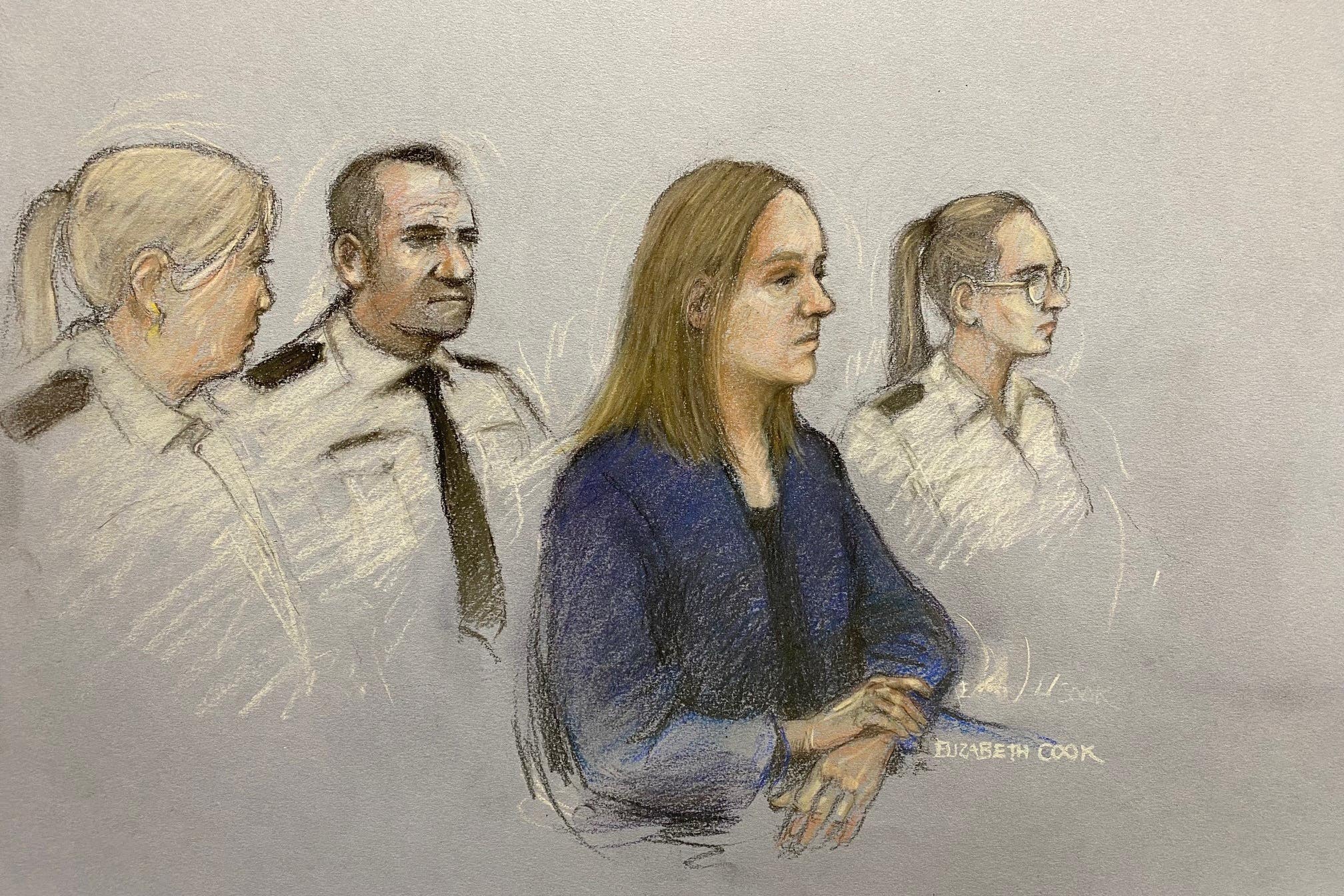Lucy Letby trial: Nurse ‘sent sympathy card to parents of baby she murdered on fourth attempt’
The alleged murder of child I was ‘extreme example even by the standards of this overall case’, court heard

A nurse accused of murdering seven babies at a neonatal unit sent a sympathy card to the parents of an infant she killed on her fourth attempt, a court has heard.
Lucy Letby, 32, who denied murdering five boys and two girls and attempting to murder another five boys and five girls at the Countess of Chester Hospital between June 2015 and June 2016, is said to have kept an image of the card she sent to child I’s family on her phone.
She is alleged to have tried to murder some of the babies more than once.
On the third day of the prosecution opening on Wednesday, Manchester Crown Court also heard how a concerned doctor walked in on the nurse while she was allegedly trying to kill another baby girl, child K.
Letby is accused of trying to murder a different baby, child N, three times. The nurse also allegedly murdered two boys from a set of triplets, child O and child P, on successive days.
Prosecuting, Nick Johnson KC said the alleged murder of child I was an “extreme example even by the standards of this overall case”.
Mr Johnson said: “This is a case where we allege Lucy Letby tried four times to kill her. [Child I] was resilient but ultimately at the fourth attempt Lucy Letby succeeded and killed her.”
Letby is alleged to have first injected air into child I’s stomach through a nasogastric tube – just days after attempting to murder another baby, child H.
In the second alleged attempt on her life, jurors were told a night-shift colleague recalled seeing Letby standing in the doorway of a darkened room in the neonatal unit when the defendant remarked that child I looked pale.
The fellow nurse turned on the light and saw child I “appeared to be at the point of death and was not breathing”. Mr Johnson said jurors may wonder how Letby could make the observation of child I’s appearance by looking into a darkened room.
The court heard that child I collapsed and required chest compressions in the early hours of 23 October 2015, but was successfully resuscitated. Less than an hour later the child’s monitor alarm sounded.

Mr Johnson said that a colleague of the defendant responded and found Letby standing by the child’s incubator. The court heard that the nurse wanted to intervene as child I was “distressed” but Letby said “they would be able to sort it”. Child I collapsed and died after attempts to revive her were unsuccessful.
Mr Johnson said an expert paediatrician who reviewed child I’s case concluded the baby’s deteriorations were consistent with the deliberate administration of a large amount of air into her stomach.
The medic also believed that on the final occasion the baby had been injected with air into her bloodstream, which led to her “screaming”, followed quickly by her collapse.
When interviewed by police, Letby was asked about a sympathy card she had sent to child I’s parents. Mr Johnson said: “She said for a nurse to send a card was not normal and it was the only time she had done it, but it was not often the nurses got to know a family as well.”
Letby accepted she kept an image of the card on her phone, Mr Johnson said.
Doctor ‘walked in on Letby as she tried to murder newborn’
The court also heard how a doctor walked in on Letby as she allegedly tried to murder a newborn girl.
Ravi Jayaram, a paediatric consultant, had helped deliver the baby – child K – who was born at 25 weeks, weighing just 692g, on 17 February 2016 at the Countess of Chester Hospital.
Child K was considered in as good a condition as possible for a baby born that early and was booked into the neonatal unit by Letby. The court heard Dr Jayaram later went to check on the baby after he had started to “notice the coincidence between the unexplained deaths, serious collapses and the presence of Lucy Letby”.
He walked into the room to see Letby standing over child K’s incubator and could see from a monitor that the baby’s oxygen saturation level was falling dangerously low. But the alarm was not sounding as it should have been and Letby had not called for help.
“We allege she was trying to kill child K when Dr Jayaram walked in,” Mr Johnson said.
Dr Jayaram found child K’s chest was not moving and asked Letby if anything had happened. Letby was said to have replied: “She’s just started deteriorating now.”
Dr Jayaram found child K’s breathing tube had been dislodged. The breathing monitor should have sounded but can be overridden by pressing a pause button, the jury heard.
Despite his concerns at the time, Dr Jayaram did not make a note of his suspicions or the alarm failing to activate. Child K was transferred to another hospital later that day but remained unwell and died two days later. Letby is not accused of her murder.

Letby ‘wrongly believed baby boy’s haemophilia gave her “cover” to attack him’
Mr Johnson also told jurors about child N, who Letby is alleged to have attempted to kill three times.
The baby boy was born at 34 weeks on 2 June 2016 at the Countess of Chester Hospital, weighing 3.6lbs. His clinical condition was described as “excellent” although he had mild haemophilia, a blood disorder.
This meant, Mr Johnson said, Letby wrongly believed that his haemophilia gave her “cover” to attack him because if he bled it would be put down to the condition.
The day child N was born, Letby was one of five nurses working when he suffered a sudden lowering of his blood oxygen levels to life-threatening levels.
Independent medical experts said the child’s sudden deterioration was consistent with an “inflicted injury” or him having received an injection of air. On 15 June, Letby is alleged to have made two more attempts to murder child N.
He was later transferred to a specialist children’s hospital in Liverpool where he recovered.
Letby ‘murdered two male triplets on successive days’
Letby is also accused of murdering two male triplets, child O and child P, on successive days in June 2016.
The court heard child O was in good condition and stable up until the afternoon of 23 June when he suffered a “remarkable deterioration”.
A post-mortem examination found unclotted blood in his body from a liver injury and a coroner certified death on the basis of natural causes and intra-abdominal bleeding. An independent pathologist who reviewed the case said the most likely cause was an impact-type trauma, Mr Johnson said, adding: “In brutal terms, an assault.”
The expert also concluded child O had fatefully received excessive amounts of air into the bloodstream and through a nasogastric tube.
Letby ‘attacked two sets of newborn twins in similar circumstances’
Letby attempted to murder twin boys, child L and child M, in “similar” circumstances to two other twin boys she attacked, the court heard.
In August 2015, it is alleged Letby murdered child E by injecting air into his bloodstream and the next day attempted to kill his brother, child F, by insulin poisoning.
Letby was working a day shift on 9 April 2016 when she is said to have given an unauthorised dose of insulin to child L. While that attack was under way, Mr Johnson said, Letby turned her attentions to his brother, child M, by injecting air into his circulation.
Mr Johnson said because Letby failed to kill child F, she decided to increase the dose of insulin administered to child L.
Child M came “close to death” after his heart rate and breathing dropped dramatically without warning, Mr Johnson said, but improved on the night shift that followed and went on to make a speedy recovery. Mr Johnson said: “We suggest these cases [child E, F, L and M] are similar in that one of each pair suffered an insulin overdose whereas it is suggested the other suffered an air embolism.”
The trial continues.
Press Association contributed to this report


